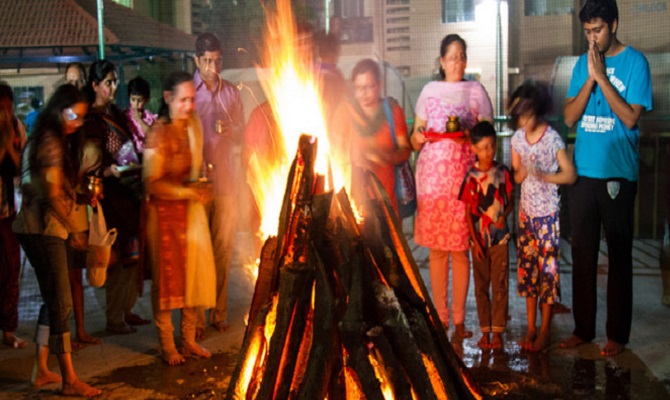Holika Dahan Puja is a traditional Hindu festival that is celebrated annually in India and Nepal. This festival is observed on the full moon day in the Hindu month of Phalguna, which usually falls in late February or early March. The festival marks the victory of good over evil and the arrival of spring.

Holika Dahan is celebrated by building a bonfire and performing puja rituals around it. The bonfire represents the burning of Holika, an evil demoness who was defeated by Lord Vishnu. According to Hindu mythology, Holika had a boon that made her immune to fire. However, she tried to use this boon to kill her nephew, Prahlad, who was a devotee of Lord Vishnu. Holika lured Prahlad into a pyre, but due to his devotion, Lord Vishnu saved him, and Holika was burnt instead.
On the day of Holika Dahan, people gather around the bonfire and offer prayers to Lord Vishnu and Lord Shiva. They also sing and dance around the bonfire and exchange sweets and greetings with each other. Many people also perform parikrama, which is a ritual of walking around the bonfire in a clockwise direction, while reciting prayers.
Holika Dahan Puja is not only a celebration of the victory of good over evil, but it also symbolizes the arrival of spring and the end of the winter season. People prepare special dishes and delicacies, such as gujiya, mathri, and dahi bhalla, and offer them to the deities. The festival is a time for people to come together, forget their differences, and celebrate the spirit of unity and brotherhood.
In conclusion, Holika Dahan Puja is a significant Hindu festival celebrated in India and Nepal. It is a time to celebrate the victory of good over evil and the arrival of spring. People perform puja rituals around a bonfire, which represents the burning of the evil demoness Holika. The festival also signifies the importance of unity and brotherhood, as people come together to celebrate the spirit of the festival.
"हिरण्यकशिपोर्वक्त्रात् प्रह्लादस्य कथंचन। उत्थापयासाहस्राक्ष क्षिप्रमाविश्य तिष्ठतु।।"